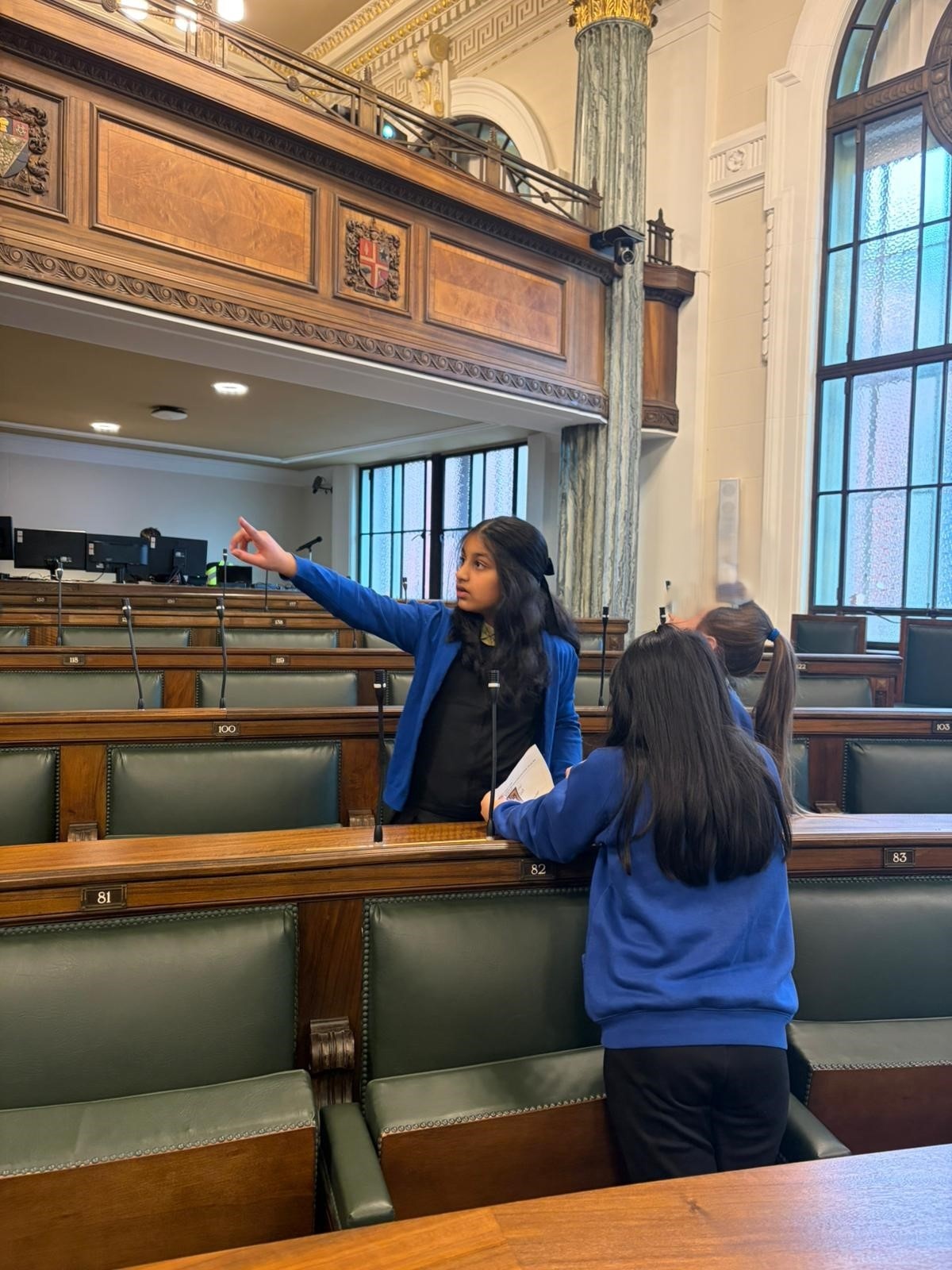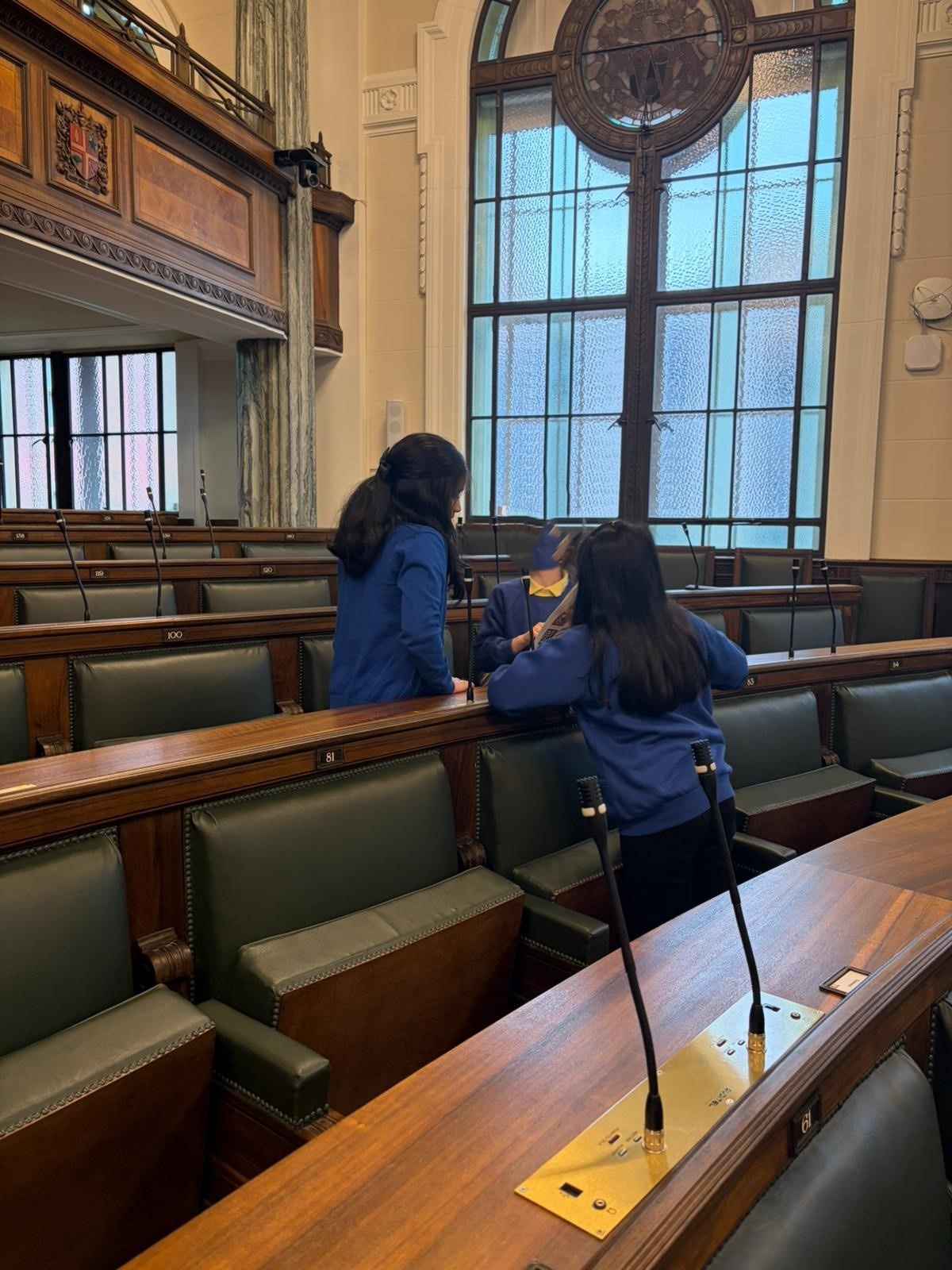
Burnley St Peter's C of E Primary School
Behaviour
Our school has been awarded the GOLD Lancashire Behaviour Quality Mark Accreditation. This external recognition reflects our consistently high standards in all aspects of behaviour and confirms that our practice is among the very best.
Achieving GOLD also highlights the strong, positive relationships our staff build with children and their families every day. We are incredibly proud of this accomplishment and grateful to everyone in our school community who contributes to making our environment safe, respectful, and nurturing.
On Tuesday, 3rd February 2026, members of our School Council travelled to Preston Town Hall to receive the award in person. They had the opportunity to sit in the historic council chambers and learn how Lancashire officials use the space to make important decisions for our county. It was a memorable experience that helped our pupils understand how local democracy works and the role they play as young representatives of our school.

Here are some of the highlights from the report -
Policy:
The school’s behaviour policy is clear, well-structured, and widely regarded by staff as straightforward to use and follow. A particular strength is the graduated response system, which provides consistency and clarity in managing behaviour. Children also demonstrate a strong understanding of these expectations; they can confidently explain the steps involved when a consequence is given and frequently refer to the ‘dot system’ and reflection sheets as part of this process. Alongside this, the Learning to Learn curriculum is comprehensive and thoughtfully designed, ensuring pupils are explicitly taught the skills and behaviours that underpin successful learning. The child-friendly version of the behaviour policy, created by the school council, further reinforces accessibility and ownership among pupils. These approaches have contributed to tangible improvements in attendance and punctuality, supported by the introduction of a new reward system that motivates and celebrates positive habits.
School Culture:
The behaviour culture at the school is warm, welcoming, and deeply rooted in a sense of family and belonging. Both children and staff create an atmosphere of togetherness, underpinned by strong Christian values that shape the ethos of the school. Behaviour expectations are not only clearly defined but are consistently embedded across all year groups and settings, ensuring they are lived out in daily practice. Class Charters, designed with inclusive symbols, make expectations accessible to every child. High standards are upheld by all staff, extending beyond behaviour to include learning habits and self-help skills. For example, even the youngest pupils in Reception are taught strategies to put on coats independently and use knives and forks at lunchtime, reflecting the school’s commitment to fostering independence. Expectations are displayed prominently throughout the school, such as reminders for active listening and the well-known mantra of “Fantastic Walking.” Staff reinforce these standards through specific, positive praise—for instance, a Year 3 teacher acknowledging patience with, “Thank you so much for waiting patiently.” These consistent practices create a calm, respectful environment where children feel secure and motivated to do their best.
Conduct Around School:
Conduct around the school is frequently exemplary, for instance in whole school worship, reflecting the high standards and consistent modelling by staff. The well-established practice of “Fantastic Walking” is embedded across all year groups and continues to be reinforced by adults, ensuring calm and orderly movement throughout the day. Lunchtime routines are another strength, carefully structured to promote positive behaviour. Staggered timings in the lunch hall reduce congestion and create a calmer atmosphere, while clear systems ensure smooth transitions. Outdoors, behaviour is supported by thoughtful organisation: football and cricket areas are zoned to minimise conflict, and supervision is robust, with a designated first aider and two floating staff members available to intervene promptly if needed. These measures combine to create a safe, respectful environment where pupils can enjoy social time positively and responsibly.
Relationships:
Positive relationships are a defining strength of the school and underpin its welcoming, respectful atmosphere. Mutual respect is evident across all areas of school life, including lunchtimes, creating a calm and supportive environment. Staff know pupils exceptionally well, enabling a proactive approach to behaviour and social, emotional, and mental health (SEMH) needs. This is further supported by thoughtful staffing decisions, such as allocating key adults to specific target groups—for example, Year 5 pupils working closely with Mr Vanboyd (ELSA)—to maintain consistency and nurture strong relationships. These values are lived out daily: children are often seen helping one another, even with simple acts like putting on coats, reflecting the school’s ethos of care and cooperation. Staff relationships are equally positive, marked by a strong sense of teamwork and friendship, which contributes to the overall culture of trust and collaboration. Parents speak highly of the school’s communication and commitment to partnership. They appreciate being kept well-informed about behaviour expectations through the PING app, positive phone calls home, and the weekly newsletter. Many comment on the open-door policy of the Headteacher, noting that nothing is ever too much trouble, which reinforces the school’s reputation for approachability and support.
Curriculum and Learning:
Learning environments across the school are thoughtfully designed to support calm, focused learning. Cognitive load is carefully considered, with seating arrangements and resources positioned to promote organisation and minimise distractions. Classrooms have an orderly, purposeful feel—even in busy moments such as just before lunch in EYFS. From the earliest stages in EYFS, routines and expectations are firmly established. Practices such as “Fantastic Walking” are clearly embedded, and children demonstrate attentive listening during carpet sessions. Class charters, co-produced with pupils, are consistently revisited to reinforce shared rules, values, and expectations, fostering ownership and responsibility. Learning qualities are not only displayed but actively lived out, celebrated in weekly worship so that children understand their meaning and how to embody them in daily life. The Learning to Learn curriculum further strengthens this approach by explicitly teaching pupils what good behaviour looks like and how it supports successful learning. This structured, proactive model ensures that behaviour for learning is a core part of the school’s ethos, enabling children to thrive academically and socially.
Inclusion:
Inclusion is a clear strength of the school, reflected in the thoughtful systems and practices that support every child’s individual needs. The calm room provides a safe space for co-regulation and self-regulation, where children can choose to visit independently or be guided by an adult. This proactive approach helps pupils manage emotions effectively and fosters independence. The Emotional Literacy Support Assistant (ELSA) plays a vital role in promoting well-being. Children are selected for ELSA support at the start of the year, but referrals remain open throughout, ensuring provision is needs-led and flexible. Parents are actively involved, and impact is carefully monitored through assessments of SEMH skills, with progress measured and reviewed after interventions to ensure tailored support. Regular ELSA cohort training and cluster meetings further strengthen expertise across the team. The SENCO is highly proactive, seeking external support when necessary and maintaining strong professional development. Strategies are personalised: for example, a Year 5 pupil with ADHD described how teachers help her calm down and how the calm room, with sensory bags, is invaluable for regulating emotions. Similarly, pupils with PDA benefit from a choice-based curriculum that promotes autonomy, alongside social stories and visual indicators to reinforce strategies. Classroom resources and texts reflect neurodiversity, ensuring representation and fostering understanding among all pupils. These inclusive practices demonstrate the school’s commitment to meeting diverse needs and creating an environment where every child feels supported, valued, and able to thrive.
Safety:
Safety is a cornerstone of the school’s culture, with clear systems and vigilant staff ensuring that every child feels secure and respected. Adults act swiftly to challenge any use of derogatory language or stereotyping, reinforcing an ethos of equality and inclusion. A well-planned calendar of events promotes anti-bullying values, diversity, and acceptance, embedding these principles into the life of the school. Pupils trust leaders to respond quickly and effectively to any concerns, which strengthens confidence in the school’s safeguarding approach. Key adults and designated safe spaces are readily available for children to access during vulnerable times, ensuring emotional and physical safety is prioritised throughout the day. Children themselves demonstrate a strong understanding of safety expectations; for example, when discussing an upcoming trip to Blackpool Zoo, they confidently explained that they would follow school rules to stay safe beyond the classroom.
Staff Support and Development:
Staff development is another clear strength of the school, with individual expertise both recognised and nurtured. The ELSA and teaching assistants are highly knowledgeable and demonstrate enthusiasm for maintaining high behaviour standards. Their skills have been effectively utilised and further developed through targeted opportunities. A wealth of professional development has already taken place, and additional training is planned for the future. Senior leaders view behaviour as an ongoing priority—something that evolves rather than a task that can be completed—ensuring that staff remain equipped with the latest strategies and approaches. Staff report feeling empowered to apply the graduated response confidently and manage behaviour incidents independently, without unnecessary escalation to senior leadership. At the same time, they value the strong support network provided by SLT, knowing that guidance and assistance are readily available whenever needed. This balance of autonomy and support fosters confidence and consistency across the school.









